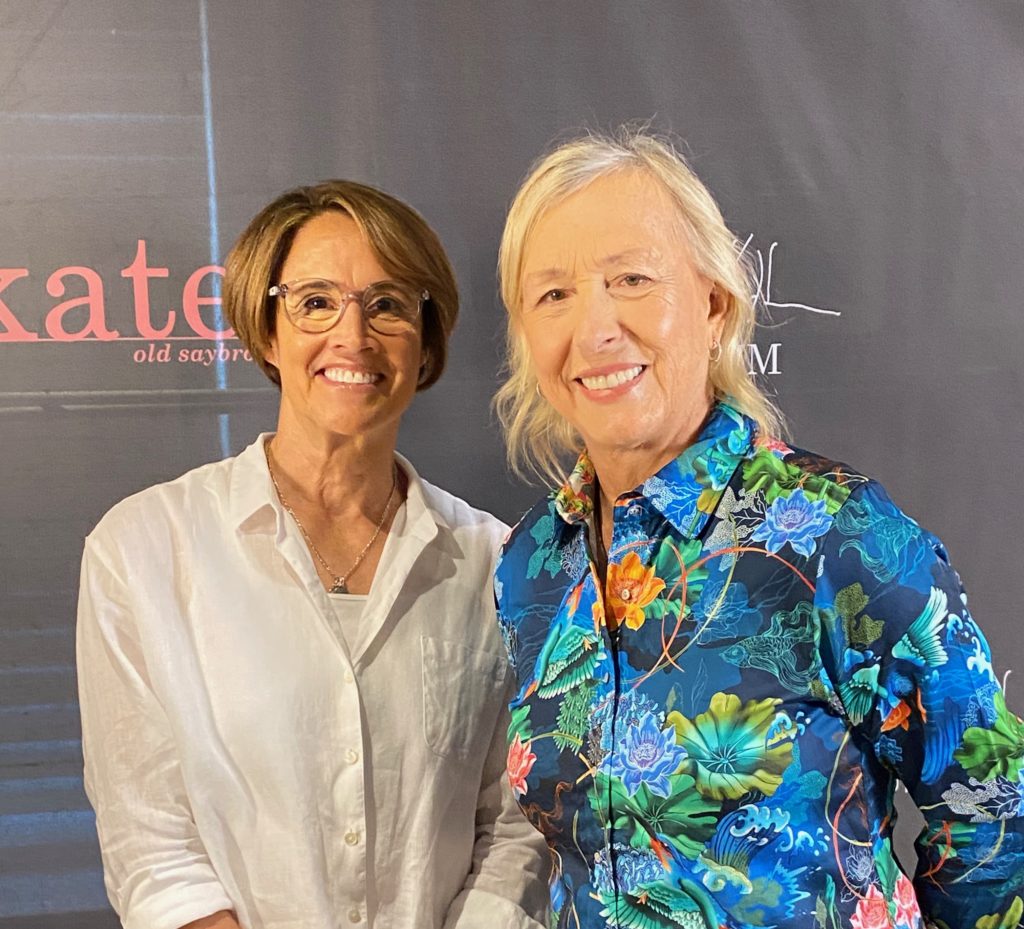The Katharine Hepburn Cultural Arts Center, aka The Kate, celebrated the famous actress’s love for tennis and one of the sport’s superstars at its annual fundraising gala in Old Saybrook this past August. The tennis-themed event, titled “She’s Got Game” and hosted by WTNH-TV’s Ann Nyberg, was a celebration of the loving friendship Hepburn shared with legendary tennis player and lesbian icon, Martina Navratilova.
The Kate presented Navratilova, 65, with its seventh annual Spirit of Katharine Hepburn Award, for embodying the bold spirit, fierce independence, and distinctive character of the world-famous actress.
In a career spanning four decades, Navratilova won 59 Grand Slam titles: 18 singles, 31 doubles, and 10 mixed doubles. She remained on the top of Women’s Tennis Association rankings for a record 332 weeks and is one of only three WTA players to achieve a Career Grand Slam in singles. When she came out in 1981, she had only recently defected from Czechoslovakia. She was 18, already a tennis champion and one of the first lesbian athletes to come out of her own volition.
Off the tennis court, Navratilova has been a vocal advocate for lesbian, gay and bisexual rights, animal rights and she’s taken a public stand against communism. Since 2019, she’s also taken up the cause of opposing the inclusion of transgender girls and women in sports, with the exception of trans girls who have not yet experienced puberty.
On hand to welcome the cisgender rights activist on August 27 were Governor Ned Lamont and his wife, Annie, Sen. Richard Blumenthal, the cultural center’s trustees and the event’s sponsors, Electric Boat and Whelen Engineering Company, among others.
Following an auction to benefit The Kate and its programs, scholarships and Kate’s Camp for Kids, Navratilova was presented with the award, a wood-carving statuette bearing the likeness of Hepburn, sitting crossed-legged on a dock in Stratford, created by artist Kimberly Monson of New London.
Navratilova was then interviewed on stage by Olympic correspondent and tennis analyst Mary Carillo, a friend for 45 years.
“Here is the thing about Martina,” said Carillo. “You think of Katharine Hepburn as the quintessential, forthright, patrician, blue-blooded American. I gotta’ tell ya’, this woman here, who was born in the Czech Republic, is every bit as American and every bit a lover of this country as Katharine Hepburn.”
“I like to think so,” Navratilova said in agreement, describing Hepburn as a woman she had grown up admiring, whose entire persona said to her, “Don’t mess with me.”
Navratilova enchanted the audience with stories of her many visits with Hepburn, a friendship which began with the tennis player sending the actress flowers on her birthday, “Every year for two or three years,” she said.
One year, Hepburn responded to her gift in a letter, providing her phone number and inviting her to call any time she was in New York City. When Navratilova traveled there to compete in the U.S. Open a few months later, she said she worked up the courage to dial Hepburn’s number.
Hepburn, she said, picked up on the first ring and answered, “Hello?”
“Hello, Ms. Hepburn, this is Martina Navratilova.” she said, nervous, and not expecting the star to answer her own phone.
Hepburn replied, “It’s about time!” The audience roared with laughter, and Navratilova continued. “Honest to God!” she said. “I was just terrified. And she asked, ‘When are you coming over?’”
Navratilova would pay her many visits, both at her New York apartment and a few times here in Connecticut. Hepburn wanted to know how the tennis player didn’t get nervous playing at such a competitive level as she did, and shared lessons she’d learned over the years.
“The best word of advice I got from her, and sometimes it’s worked well for me and sometimes it doesn’t: ‘It’s not what you start in life, it’s what you finish,’” she said.
Carillo evoked tears from Navratilova toward the end of their chat, when she asked what it was like defecting to the United States at 18, knowing she might never see her family again.
“It turned out it was four years before I saw my mom, and five years before I saw my dad,” she said, her voice cracking with emotion. “It was a one-way ticket, and that’s what the hardest part was. I didn’t have a coach for six years and finally [transgender tennis pioneer], Renée Richards became my coach in ’81. So, I did it alone. And when people say, ‘Oh, it’s really tough for the athletes these days…’” Again, the audience erupted in laughter, and then applause.
During their on-stage interview, Carillo did not ask Navratilova about her opposition to transgender inclusion in sports or mention that Connecticut’s constitution and scholastic sports policy allows every transgender student-athlete to compete on sports teams matching their gender identity.
Despite persistent rumors regarding Hepburn’s sexual orientation, that issue was never discussed. Carillo also didn’t note Connecticut’s scholastic sports policy allows every student-athlete to compete equally, nor did she ask Navratilova about her opposition to transgender inclusion in sports.
—Dawn Ennis









More Stories
Theater Kid
Queer Joy and Queer Resilience
Transforming Sexuality: Handling Sexual Changes for Trans Folks